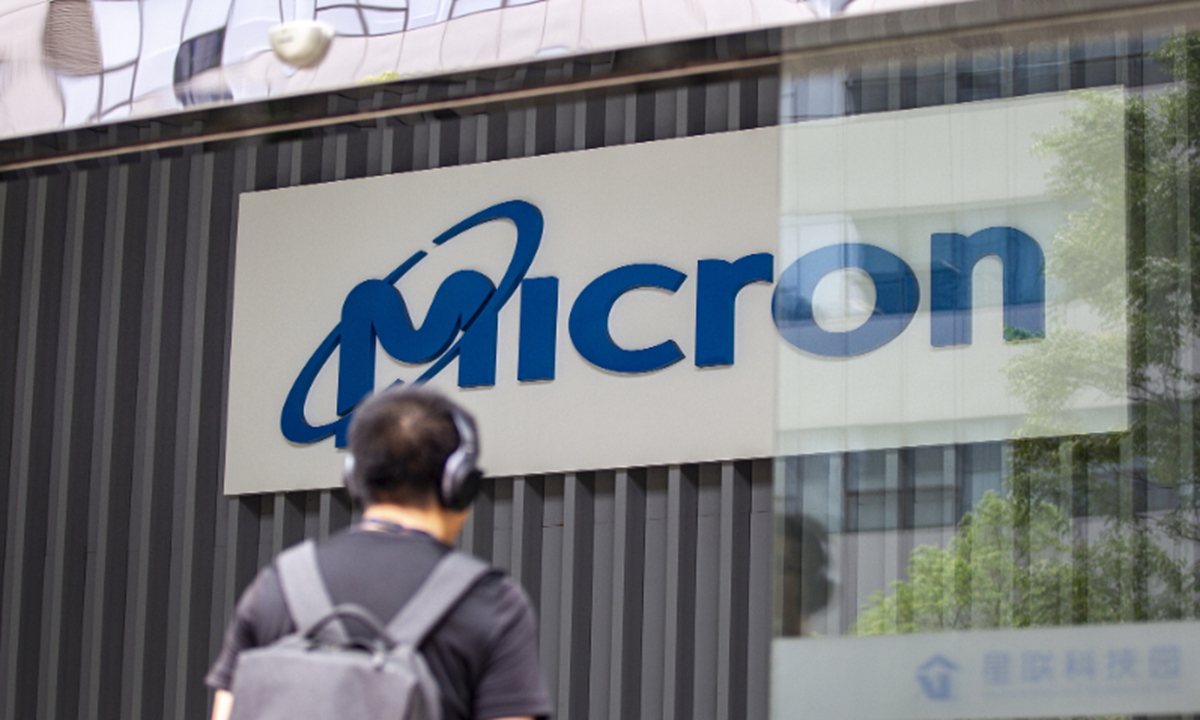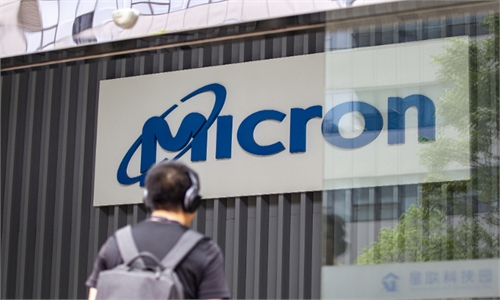Micron to attend China’s import fair, as chipmakers cling to Chinese market despite US bans

US-based semiconductor firm Micron Photo: VCG
Embattled US chip giant Micron Technology plans to participate in China's major import fair scheduled for early November in Shanghai for the first time, according to a media report on Tuesday, highlighting the firm's effort to cling to the Chinese market despite rising challenges.
The report of Micron's plan for attending the China International Import Expo (CIIE) comes just a day after two South Korean chipmakers were granted an indefinite waiver by the US to supply chip gear to their plants in China. Collectively, the news underscored global chipmakers' unwavering focus on the Chinese market and the failure of the US bans on normal chip trade, experts said.
Micron will participate in the sixth CIIE from November 5 to 10 in Shanghai, Chinese financial news portal yicai.com reported on Tuesday, citing sources from the company. This would be the first time the US chipmaker attends the event, and the firm is actively making relevant preparations, the report said.
Micron's offices in Beijing, Shanghai and Shenzhen could not be reached by the Global Times for comment as of press time on Tuesday.
If confirmed, the move by Micron is significant, given the extremely complex situation that the US chip giant is in. In May, Micron failed to pass a seven-week cybersecurity review by Chinese regulators, who concluded that Micron's products have serious network security risks that pose significant security risks to China's critical information infrastructure supply chain and affect China's national security.
Meanwhile, the US government is sparing no effort in forcing global chipmakers to cut ties to the Chinese market.
Still, attending the CIIE, a major platform for foreign businesses to showcase their products and services to Chinese clients, seems to be in line with Micron's efforts to cling to the Chinese market. In June, even after failing the pass the security review, the company announced that it would invest over 4.3 billion yuan ($603 million) in its packaging and testing plant in Xi'an, Northwest China's Shaanxi Province, in the next few years, which the company said "showcased its unswerving commitment" to the Chinese market.
Micron's plans in the Chinese market as well as the US government's decision to allow two South Korean chipmakers, Samsung and SK Hynix, to supply chipmaking tools to their Chinese plants indefinitely have exposed the US government's anti-market attempts to cut chip supplies to China, Chinese experts said.
"There is a saying in the US: If you cannot beat them, join them," Wang Yiwei, director of the Institute of International Affairs at the Renmin University of China, told the Global Times on Tuesday, noting that the US is realizing that it cannot contain China by imposing restrictions.
Still, the US government will not easily give up its attempt to suppress China's chip development so as to maintain its dominant position. After it was widely reported that a Chinese telecom giant had made breakthroughs in chips used in its latest smartphones, US politicians have been calling for even more restrictions on sales of advanced chips and chipmaking tools to China.
However, such calls have also met with firm opposition from American chip firms, including Nvidia, Intel and Qualcomm, with many warning that more restrictions will only hurt US businesses and force China to accelerate the development of its own chips, according to media reports.
Wang also said that if the US continues to crack down on the Chinese chip industry by imposing blockades, it will eventually realize that China has actually "switched lanes and surpassed [the US]."
Apart from Huawei, other Chinese companies and researchers have been making steady progress in chip developments. On Tuesday, it was reported that researchers at Tsinghua University developed the world's first fully system-integrated memristor computing-in-memory chip that supports efficient on-chip learning, which is also energy efficient.
Based on nanometer-scale memristor, the computing-in-memory architecture is like a new working model of "working from home," which completely eliminates the energy consumption in data transmission and greatly enhances the operating speed, Yao Peng, the co-first author of the recently published paper, told the Global Times on Tuesday.
"Such advantages could have broad application in future edge computing and cloud computing," Yao said.
Steadily making breakthroughs is the best way to beat back US suppression, said Ma Jihua, a chip industry observer in Beijing. "The US will back down in areas wherever our technologies become mature one by one. That will definitely be the case," Ma told the Global Times.

